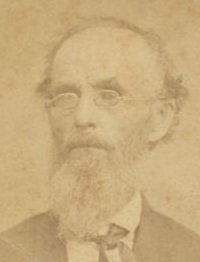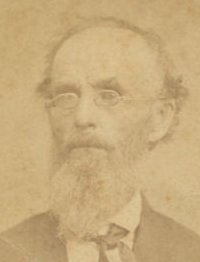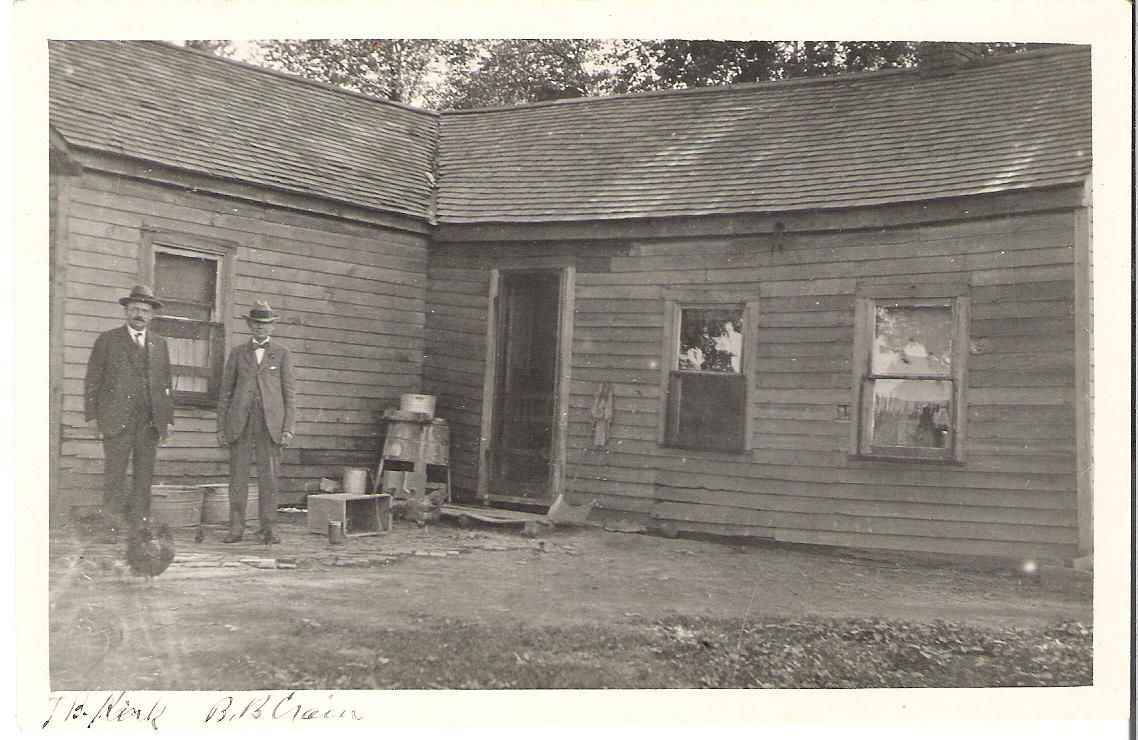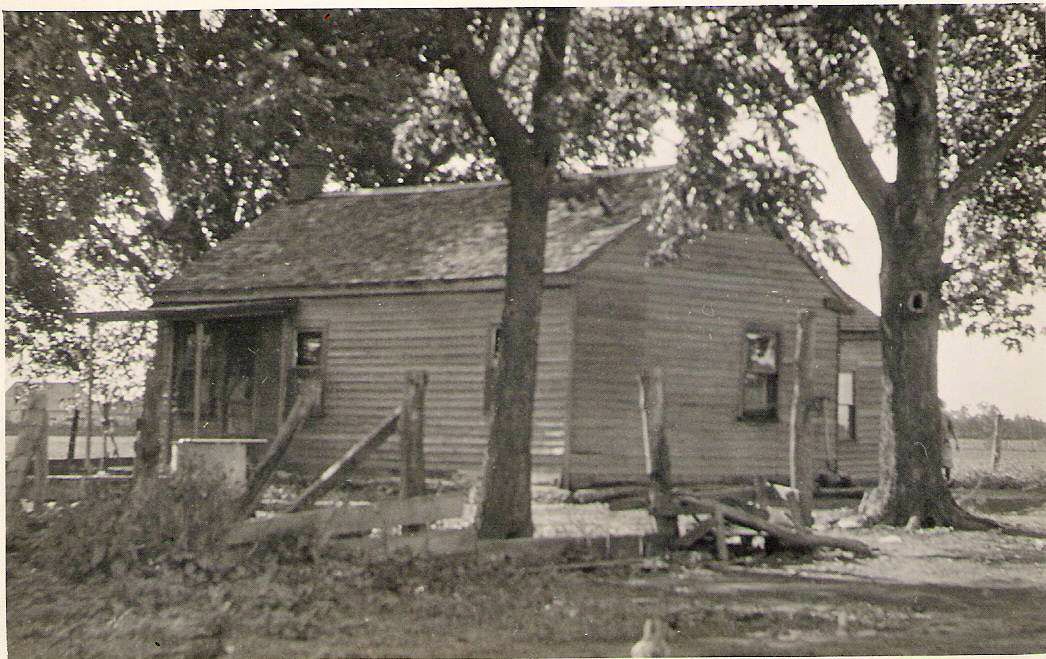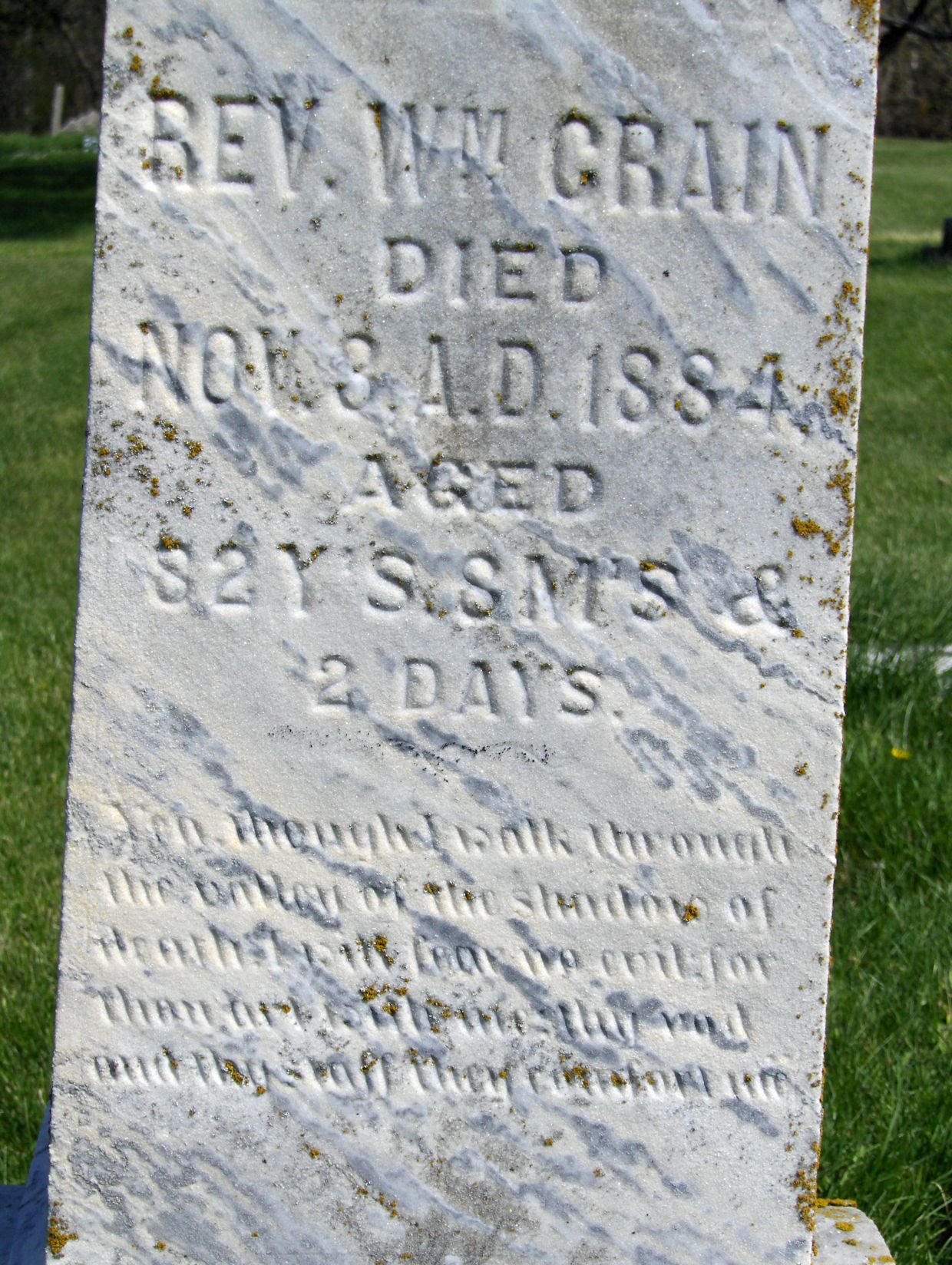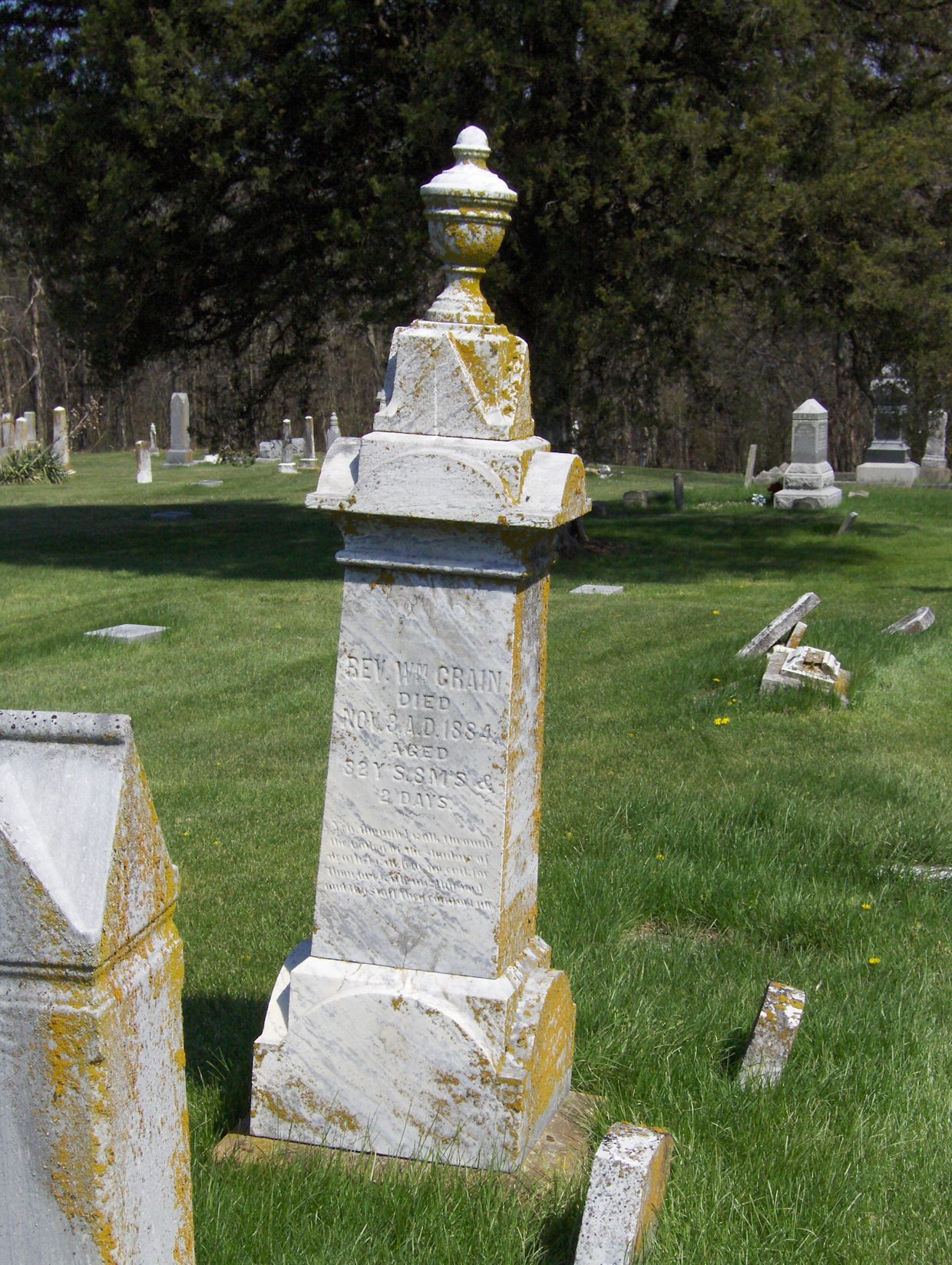Grandfather served as an itinerant Methodist minister at different points in Kentucky and southern Indiana. In the late '20's he was transferred to central Missouri. One year he covered a circuit the Missouri and Osage Rivers, with Jefferson City as one of his preaching points. There he preached to the Missouri Legislature in the little log meeting house under the bluff and twice by invitation in the State Capitol then a two story brick house on Madison Street, near where the Governor's mansion stands (this data regarding Jefferson City is from Major James C. McGinnis's autobiography manuscripts, written in 1876). In 1830 his health had become affected by the constant travel and exposure of circuit riding, and he was transferred to southeastern Missouri, presumably to less arduous duties. Early in the year 1832 he was married to Harriet Tong, who was born in Fredericktown, Missouri, June 24, 1817. He had met her when he was traveling over a circuit for the first time. He was to preach at a certain church one Sunday afternoon, and several young couples from that place rode over on horseback to where he was to preach in the forenoon, in order to welcome him and show him the road to his afternoon appointment. Having heard that the new preacher was a bachelor, they selected an extra girl to keep him company on the way back. This extra girl was Harriet Tong, and the selection proved to be highly satisfactory to both parties concerned. They were married within a few months, she being not quite fifteen at the time of her marriage.
Grandfather Crain was more than six feet tall, and very active and erect, even in his old age. On his seventy-fifth birthday he went into the woods nearby and split seventy-five rails, one for each year of his age. He himself attended to all the outdoor work around the farm home until his last illness. His manner was rather stern and inspired respectful attention from those with whom he dealt, but at heart he was affectionate and generous, being possessed with a fervent desire to do good to all and harm to none. I used to stand in awe of him until one day he made some playful remark, which conveyed even to my childish mind the fact act that he possessed the "saving sense of humor." I remember hearing the last sermon he ever preached. It was in the summer of 1884, I believe. The regular pastor was absent and Grandfather filled his place. In the course of his remarks he said that that would doubtless be his last sermon and so it was.
On one occasion in the early days there was a great scarcity of corn in this part of the country. Many of the neighbors were without corn or the money with which to buy it. Men would drive many miles seeking out the few farmers who had raised good crops. Grandfather was one of these latter, and one day three men drove in wagons up to Grandfather's house, they having come from the Elm Tree neighborhood east of Carthage, a distance of perhaps 25 miles from home. Grandfather would not talk business with them until after he had fed their teams and the men themselves had had dinner. Then, when they insisted upon buying his corn he said, "Well, have you the money to pay for it?" When they quickly assured him that they had the cash with them, he said, "Well, if you have the money to pay for the corn you can buy it somewhere else. I'm saving this corn for my neighbors who haven't got the money to buy it anywhere else." He then directed them to the farm of "Boss" Combs near LaPrairie, who had corn for sale.
My great-grandfather, John Crain, owned several slaves, and many were the anecdotes among our family traditions about Rachel and Nellie, the latter a capable old-time "black mammy" cook; Jerry, the farm hand, whose feet were so enormous that to this day can be heard in the vicinity of the "Old Kentucky Home" the expression "So-and-so has feet as big as Jerry Crain's;" and Simon Peter, the comical little black boy, who drove the oxen to pasture and did many chores about the farm-house. But my grandfather was strongly opposed to slavery, and when his father died he would not accept any of the proceeds from the sale of the slaves; he called it blood money and would not touch it.
Grandfather attended Sunday school and preaching regularly at Pulaski, and even at the advanced age of eighty-two he taught a class up until two or three weeks before his death.
In the fall of 1884, Grandfather planned to move to Augusta, and in making preparations for so doing he overtaxed his strength and became ill. Grandmother, while nursing him, contracted pneumonia and died November 1, 1884. I remember attending her funeral at Pulaski church on November 3, and of seeing Grandfather die that afternoon after we came back home. Before her funeral he asked that her casket might be brought to his bedside so that he might see her, but owing to his own critical condition it was not thought advisable to do so. They were buried side by side in their family lot in the southeastern part of the cemetery."
SOURCE: Excerpts from Ralph Waldo Crain's Pulaski section: Augusta's Story, Martha Board Chapter Daughters of the American Revolution (Augusta, Illinois: Augusta Eagle, 1922).
Grandfather served as an itinerant Methodist minister at different points in Kentucky and southern Indiana. In the late '20's he was transferred to central Missouri. One year he covered a circuit the Missouri and Osage Rivers, with Jefferson City as one of his preaching points. There he preached to the Missouri Legislature in the little log meeting house under the bluff and twice by invitation in the State Capitol then a two story brick house on Madison Street, near where the Governor's mansion stands (this data regarding Jefferson City is from Major James C. McGinnis's autobiography manuscripts, written in 1876). In 1830 his health had become affected by the constant travel and exposure of circuit riding, and he was transferred to southeastern Missouri, presumably to less arduous duties. Early in the year 1832 he was married to Harriet Tong, who was born in Fredericktown, Missouri, June 24, 1817. He had met her when he was traveling over a circuit for the first time. He was to preach at a certain church one Sunday afternoon, and several young couples from that place rode over on horseback to where he was to preach in the forenoon, in order to welcome him and show him the road to his afternoon appointment. Having heard that the new preacher was a bachelor, they selected an extra girl to keep him company on the way back. This extra girl was Harriet Tong, and the selection proved to be highly satisfactory to both parties concerned. They were married within a few months, she being not quite fifteen at the time of her marriage.
Grandfather Crain was more than six feet tall, and very active and erect, even in his old age. On his seventy-fifth birthday he went into the woods nearby and split seventy-five rails, one for each year of his age. He himself attended to all the outdoor work around the farm home until his last illness. His manner was rather stern and inspired respectful attention from those with whom he dealt, but at heart he was affectionate and generous, being possessed with a fervent desire to do good to all and harm to none. I used to stand in awe of him until one day he made some playful remark, which conveyed even to my childish mind the fact act that he possessed the "saving sense of humor." I remember hearing the last sermon he ever preached. It was in the summer of 1884, I believe. The regular pastor was absent and Grandfather filled his place. In the course of his remarks he said that that would doubtless be his last sermon and so it was.
On one occasion in the early days there was a great scarcity of corn in this part of the country. Many of the neighbors were without corn or the money with which to buy it. Men would drive many miles seeking out the few farmers who had raised good crops. Grandfather was one of these latter, and one day three men drove in wagons up to Grandfather's house, they having come from the Elm Tree neighborhood east of Carthage, a distance of perhaps 25 miles from home. Grandfather would not talk business with them until after he had fed their teams and the men themselves had had dinner. Then, when they insisted upon buying his corn he said, "Well, have you the money to pay for it?" When they quickly assured him that they had the cash with them, he said, "Well, if you have the money to pay for the corn you can buy it somewhere else. I'm saving this corn for my neighbors who haven't got the money to buy it anywhere else." He then directed them to the farm of "Boss" Combs near LaPrairie, who had corn for sale.
My great-grandfather, John Crain, owned several slaves, and many were the anecdotes among our family traditions about Rachel and Nellie, the latter a capable old-time "black mammy" cook; Jerry, the farm hand, whose feet were so enormous that to this day can be heard in the vicinity of the "Old Kentucky Home" the expression "So-and-so has feet as big as Jerry Crain's;" and Simon Peter, the comical little black boy, who drove the oxen to pasture and did many chores about the farm-house. But my grandfather was strongly opposed to slavery, and when his father died he would not accept any of the proceeds from the sale of the slaves; he called it blood money and would not touch it.
Grandfather attended Sunday school and preaching regularly at Pulaski, and even at the advanced age of eighty-two he taught a class up until two or three weeks before his death.
In the fall of 1884, Grandfather planned to move to Augusta, and in making preparations for so doing he overtaxed his strength and became ill. Grandmother, while nursing him, contracted pneumonia and died November 1, 1884. I remember attending her funeral at Pulaski church on November 3, and of seeing Grandfather die that afternoon after we came back home. Before her funeral he asked that her casket might be brought to his bedside so that he might see her, but owing to his own critical condition it was not thought advisable to do so. They were buried side by side in their family lot in the southeastern part of the cemetery."
SOURCE: Excerpts from Ralph Waldo Crain's Pulaski section: Augusta's Story, Martha Board Chapter Daughters of the American Revolution (Augusta, Illinois: Augusta Eagle, 1922).
Inscription
Rev. Wm. Crain
Died
Nov. 3 AD 1884
Aged
82 Y's 8 M's &
2 days
Yea, though I walk through
the valley of the shadow of
death I will fear no evil for
thou art with me: thy rod
and thy staff they comfort me.
Family Members
-
![]()
John Franklin Crain
1832–1872
-
![]()
James Newfield Crain
1832–1873
-
![]()
William Harris Crain
1834–1904
-
![]()
Sarah Ellen Maria "Ellen" Crain Ellis
1838–1915
-
![]()
George H Crain
1840–1840
-
![]()
Mary S Crain
1841–1841
-
![]()
Elizabeth F Crain
1843–1843
-
Julia A Crain
1845–1846
-
![]()
Harriet Eliza Crain Kirk
1847–1936
-
![]()
Benjamin Bacon Crain
1851–1946
-
![]()
Henry Clay Crain
1853–1923
-
![]()
Edward Morris Crain
1855–1945
-
![]()
Mary Frances Crain Helmick
1857–1940
